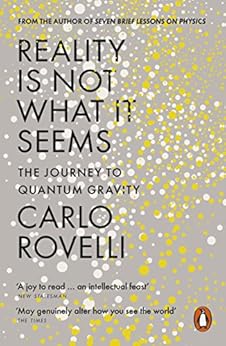 |
| Amazon link |
Rovelli is a good writer, interesting and erudite. He covers the history of philosophising about the nature of the world - void to atoms to cosmos - from antiquity to contemporary physics. He finds echoes of quantum gravity ideas in Democritus (nothing save atoms and the void): I guess there are a limited set of philosophical concepts applicable to matter and spacetime geometry.
And he tries to explain loop quantum gravity, which in its quest to derive spacetime from quantised geometry, is plainly philosophically attractive. But it's impossible. Fighting the densely sedimented layers of opaque analogy, I chanced upon: "An elementary introduction to loop quantum gravity" by N. Bodendorfer (2016).
"An introduction to loop quantum gravity is given, focussing on the fundamental aspects of the theory, different approaches to the dynamics, as well as possible future directions.Encouraging, that final sentence. So here's an extract.
It is structured in five lectures, including exercises, and requires only little prior knowledge of quantum mechanics, gauge theory, and general relativity.
The main aim of these lectures is to provide non-experts with an elementary understanding of loop quantum gravity and to evaluate the state of the art of the field.
Technical details are avoided wherever possible."
"4 Geometric operators, matter, and quantum geometryOK, so I spared you the readership-sapping equations. As I skimmed the paper I realised that I lacked the prerequisites to the prerequisites to get a handle on any of it. It's so sad.
In this section, we will discuss the construction of geometric operators and compute their action on spin network states. The strategy to derive those operators is to regularise them in terms of holonomies and fluxes and to compute their action in the limit of infinitely small holonomies and fluxes, where the exact classical expression is approached. We will again skip many technical details and only consider the most instructive cases.
For a rigorous treatment, see [42]. For original literature, see [131, 138–141].
Next, we are going to discuss how to couple matter to this theory. The emerging picture is very similar to lattice gauge theory, with the additional twist that the lattices themselves are now dynamical objects describing the gravitational sector of the theory.
For original literature, see [52, 142, 143], as well as [143–146] for a comparison to standard Fock representations. A textbook treatment is given in [42]."
Again I read the Rovelli book a few weeks ago. (Since then I have developed a simple, but basic "Homotopy" result involving Loops which might contradict a statement in that paper. (I have called it "Out Rovelling Rovelli"). But it is not a theory - just an intriguing theorem to ponder.)
ReplyDeleteI have found before that Arxiv "Introductions to X" soon delve into technical terms, making them not the kind of Introduction that one is wanting. That paper is an example. In your quote the term "Holonomy" (see WP entry) is itself non-trivial, but just breezily used in the paper.
You might recall that I mentioned the Wheeler-DeWitt equation a few Blog Comments ago. This arose because I had just finished the Rovelli book and seen how closely LQG was related to that Equation. This "Introduction" summarises (though not explains) that a bit more. Unfortunately the Wheeler-DeWitt equation is not much fun at the best of times - this is because it involves splitting GR's 4-Dim space-time into 3 Space plus 1 Time - which is a non-Relativist thing to do. All subsequent calculations / equations have to respect this non-Relativistic decomposition - with some (e.g. Lubos) not convinced that the resulting theory actually is Relativistic anyway...
Mental image of blindfolded people, arms outstretched, blundering around in dense fog in the pitch black of the small hours ...
ReplyDelete